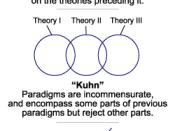There is no satisfactory criteria with which to judge a theory in isolate, which is precisely the manner advocated by Popper. FeyerabendÃÂs solution fares no better as a system with as many if not more mediocre theories breeds stagnancy, inefficiency, and an overall lack of focus. Theories should be rejected only when a superior option becomes available.
Theories are tentative conjectures or tentative hypothesis. (Referred to as ÃÂhypotheticismÃÂ by Popper) These hypotheses are paramount examples of explanatory power, the greatest cognitive tools for use in a particular domain that can be assembled from humanitiesÃÂ collective knowledge. A ÃÂgoodÃÂ theory can illuminate oneÃÂs consciousness and allow the world to be viewed in a new light. Popper, Feyerabend, and Thagard all have different views on what constitutes justification for theory elimination. PopperÃÂs criterion revolves around the theory itself. Much like the Earth centric model of our solar system, this ÃÂtheory centricÃÂ model of theory gradation and elimination is self absorbed and in error.
Popper acknowledges that confirmations of a theory via observation are not an indicator of a theoriesÃÂ superiority. He refers to this as the ÃÂproblem of induction.ÃÂ Popper claims that observations or experiments should be repeated with the goal of attempted refutations of a theory. Only by making ÃÂrisky predictionsÃÂ can a theory leave itself vulnerable to said experiments and observations. In other words the theory in question must make predictions which have a vast margin for error and must be very precise. This high level of precision is considered by Popper to be risky because of the tremendous chance of refutation the theory faces when making a prediction at that level of precision.
Popper also describes ÃÂgoodÃÂ scientific theories as being prohibitions on certain things or events. The more a theory forbids, and the greater the risks it takes...


